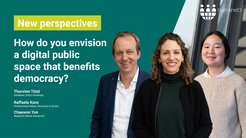New videos online: How digital public spaces can strengthen democracy
Experts from law, economics, philosophy, and the social sciences share their visions
Digital public spaces are playing an increasingly central role in democratic discourse. Yet, with the dominance of global social media platforms, core principles such as diversity of opinion, transparency, and participation are coming under growing pressure. Personalized content, algorithmic moderation, and the rapid spread of generative AI content raise pressing questions: Do these digital spaces still promote democratic exchange—or are they undermining it?

To explore this question, the interdisciplinary research group humanet3 invited experts from law, economics, philosophy, and the social sciences to a workshop in March 2025. Together, they discussed the state of digital publics, their significance for democracy, and how they can be designed to be both future-ready and democratically sustainable.
This exchange led to a video series in which selected participants share their perspectives and provide impulses for the further development of digital spaces. They respond to the question: How do you envision a digital public space that benefits democracy? After an opening featuring statements from Erik Tuchtfeld, Philipp Lorenz-Spreen, and Kristina Rao, new videos are now online with contributions from Thorsten Thiel, Raffaela Kunz, and Chaewon Yun:
Thorsten Thiel, Professor of Democracy and Digital Politics at the University of Erfurt, highlights the structural tensions facing digital publics today. Political information is essential for democratic societies—but it is difficult to monetize in a media landscape driven by attention-based logic. Thiel advocates for alternative funding models, such as democratic “vouchers”: citizens could use them to support independent journalism directly, thus actively contributing to the strengthening of democratic discourse.
Raffaela Kunz, legal scholar and postdoctoral fellow at the University of Zurich, focuses in her research on the systemic threats to fundamental rights in the digital age. The key challenge is to create digital spaces not entirely shaped by economic logic. The massive commercialization of the internet—what she calls, drawing on Jürgen Habermas, a “colonization of the lifeworld”—must be legally curtailed. At the same time, alternatives are needed: public-interest, non-commercial spaces, where discourse can occur without being dominated by market-driven logic.
Chaewon Yun, computer scientist and predoctoral fellow at the Center for Humans and Machines at the Max Planck Institute for Human Development, emphasizes the importance of digital spaces that not only tolerate diversity but actively enable it. Democracy can only function if people feel recognized in their diversity—without having to compromise their dignity. As a positive example, she cites Ravelry, an international online community for knitting and crafting enthusiasts. While not a traditional political platform, it demonstrates how digital spaces can foster community, self-organization, and plurality—all essential preconditions for a vibrant democracy.
The videos are now available online, with more contributions from academia and practice to follow in the coming weeks.
humanet3 is an interdisciplinary research initiative that critically accompanies and actively contributes to a human-centered digital transformation—aligned with the European Declaration on Digital Rights and Principles for the Digital Decade. The project is jointly supported by three Max Planck Institutes: the Max Planck Institute for Comparative Public Law and International Law, the Max Planck Institute for Innovation and Competition, and the Max Planck Institute for Human Development.
More information:






